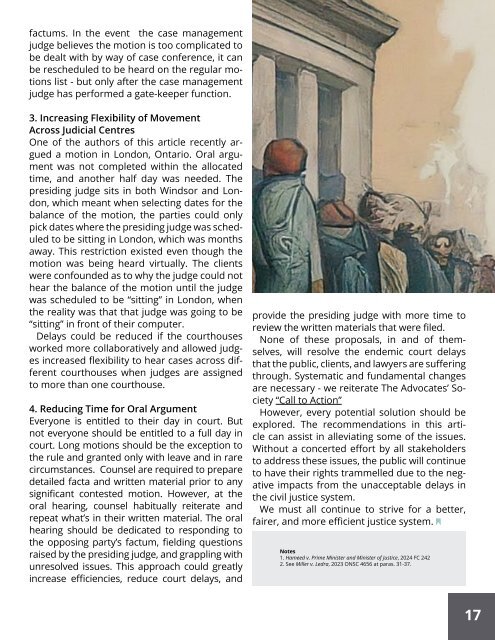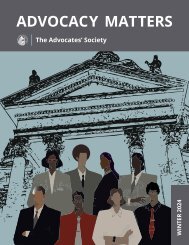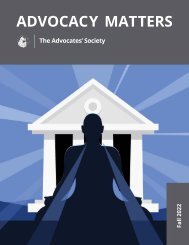Advocacy Matters - Spring 2024
Keep up to date on what your fellow Society members have to say in Advocacy Matters.
Keep up to date on what your fellow Society members have to say in Advocacy Matters.
Create successful ePaper yourself
Turn your PDF publications into a flip-book with our unique Google optimized e-Paper software.
factums. In the event the case management<br />
judge believes the motion is too complicated to<br />
be dealt with by way of case conference, it can<br />
be rescheduled to be heard on the regular motions<br />
list - but only after the case management<br />
judge has performed a gate-keeper function.<br />
3. Increasing Flexibility of Movement<br />
Across Judicial Centres<br />
One of the authors of this article recently argued<br />
a motion in London, Ontario. Oral argument<br />
was not completed within the allocated<br />
time, and another half day was needed. The<br />
presiding judge sits in both Windsor and London,<br />
which meant when selecting dates for the<br />
balance of the motion, the parties could only<br />
pick dates where the presiding judge was scheduled<br />
to be sitting in London, which was months<br />
away. This restriction existed even though the<br />
motion was being heard virtually. The clients<br />
were confounded as to why the judge could not<br />
hear the balance of the motion until the judge<br />
was scheduled to be “sitting” in London, when<br />
the reality was that that judge was going to be<br />
“sitting” in front of their computer.<br />
Delays could be reduced if the courthouses<br />
worked more collaboratively and allowed judges<br />
increased flexibility to hear cases across different<br />
courthouses when judges are assigned<br />
to more than one courthouse.<br />
4. Reducing Time for Oral Argument<br />
Everyone is entitled to their day in court. But<br />
not everyone should be entitled to a full day in<br />
court. Long motions should be the exception to<br />
the rule and granted only with leave and in rare<br />
circumstances. Counsel are required to prepare<br />
detailed facta and written material prior to any<br />
significant contested motion. However, at the<br />
oral hearing, counsel habitually reiterate and<br />
repeat what’s in their written material. The oral<br />
hearing should be dedicated to responding to<br />
the opposing party’s factum, fielding questions<br />
raised by the presiding judge, and grappling with<br />
unresolved issues. This approach could greatly<br />
increase efficiencies, reduce court delays, and<br />
provide the presiding judge with more time to<br />
review the written materials that were filed.<br />
None of these proposals, in and of themselves,<br />
will resolve the endemic court delays<br />
that the public, clients, and lawyers are suffering<br />
through. Systematic and fundamental changes<br />
are necessary - we reiterate The Advocates’ Society<br />
“Call to Action”<br />
However, every potential solution should be<br />
explored. The recommendations in this article<br />
can assist in alleviating some of the issues.<br />
Without a concerted effort by all stakeholders<br />
to address these issues, the public will continue<br />
to have their rights trammelled due to the negative<br />
impacts from the unacceptable delays in<br />
the civil justice system.<br />
We must all continue to strive for a better,<br />
fairer, and more efficient justice system.<br />
Notes<br />
1. Hameed v. Prime Minister and Minister of Justice, <strong>2024</strong> FC 242<br />
2. See Miller v. Ledra, 2023 ONSC 4656 at paras. 31-37.<br />
17

















